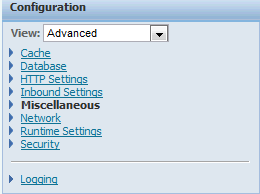Configuring a Clustered Business Services Server Instance for Consumer Business Services
If you do not configure a clustered business services server instance, then clustering for consumer business services cannot be attained and only one business services server will run all consumer business services requests.
This configuration is not applicable if you are using a standalone business services server instance.
You can configure a clustered business services server instance to support clustering for consumer business services. This clustering feature enables scalability, load balancing, and high availability for consumer business services by providing multiple incoming ports so that multiple servers in the cluster can open socket connection to different ports to receive incoming JDENet messages from the Enterprise Server, and the Enterprise Server can send JDENet messages to multiple clustered business services server ports.
After you create and register a managed instance of a business services server, you can configure the business services server instance to support clustering for consumer business services.
To create a cluster for consumer business services:
Open the Server Manager console.
In the Managed Homes pane, click the EnterpriseOne Business Services Server instance.
In the left-hand side Configuration pane, select Advanced from the View drop-down list, and then click the Miscellaneous link.

In the Miscellaneous pane, expand the cluster Outbound Configuration item.
In the Cluster Listen Host/Port field, enter cluster servers with assigned ports.

Specify multiple servers in the cluster with assigned JDENet listen ports for each server in host1:port1|host2:port2|host3:port3 format. Host can be specified with machine name or fully qualified machine name and IP address.